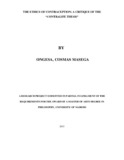| dc.description.abstract | This study set out to investigate whether the argument presented by the advocates of the
contralife thesis that artificial contraception is morally unacceptable because it’s “contralife”
always and everywhere, and that natural family planning (NFP) is morally acceptable because it
is “not contralife” is philosophically viable. The main focus of the study was to discount the
moral argument presented by Grisez, Boyle, Finnis, May, Smith and Anscombe on the moral
difference between artificial contraception and NFP. Their argument is that artificial
contraception is contralife because it is an active choice of preventing conception and that NFP is
not contralife because it is a passive choice of preventing conception.
Using deontology ethics which focuses more on the moral rightness of intentions that drive acts,
this study has demonstrated that there is no moral difference between NFP and artificial
contraception. Deontologists argue that humans by their very nature are moral agents and are
guided by a will or intent in making a choice. The choice of either natural or artificial methods of
contraception may be morally good or morally bad depending on the intent of the actor. In our
analysis, we have established that both artificial and natural methods of contraception are chosen
out of inclination that conception does not occur. They are thus both active acts of contraception
and both involve choices and intentions. The study findings indicate that the contralife argument
that artificial contraception is necessarily evil because it involves the act of “doing” to prevent
the beginning of a life of a possible person and that NFP is not evil simply because it involves
the act of “not doing” to prevent the beginning of a life of a possible person is morally flawed.
The study therefore concludes that none of the two methods is morally better than the other and
either can be used as an acceptable method of contraception. | en_US |

